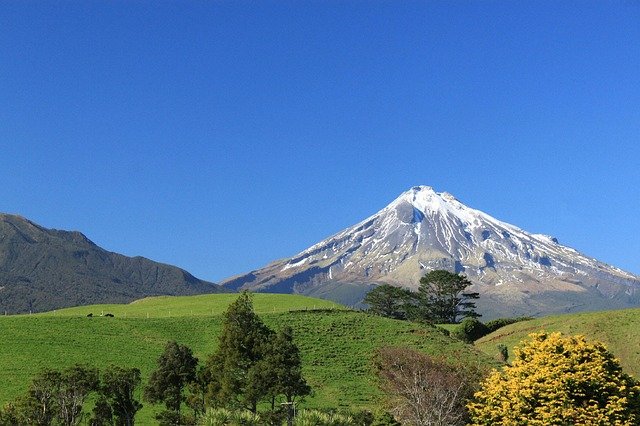This Content Is Only For Subscribers
Taranaki regional development agency, Te Puna Umanga Venture Taranaki, has launched the Summer 2024 edition of Taranaki Trends. The six-monthly publication explores how our regional economy is tracking and includes the latest key economic indicators and insightful analysis.
The summer edition was launched at the sold-out Outlook 2024 event, hosted on Tuesday, February 27, and facilitated by Stacey Hitchcock, deputy CE/GM investment at Venture Taranaki.
A diverse audience of industry professionals, business leaders, and community members gathered to hear further analysis on the data presented in the publication.
Esteemed Hāwera-born guest speaker, Frances Valintine CNZM and CEO/Founder of AcademyEX then shared her insights on navigating leadership through change.
Frances challenged attendees in the room to be bold in their long-term vision as business success will hinge on their ability to be adaptable as they experience significant shifts.
“Today’s event was a great chance to bring our community together to dive into the latest Taranaki business confidence insights, and explore the future economic landscape, including implications for leadership,” says Stacey.
With GDP recording a decline of 0.3 per cent (September 2023 quarter), Consumer Price Index (CPI) at 4.7 per cent and the unemployment rate for both Taranaki and New Zealand edging up slightly (3.8 per cent), the economy continues to recalibrate post-COVID, alongside broader challenges and changes.
However, the number of filled jobs in the region increased 1.2 per cent to 63,182 in the past year (March 2023), with Māori filling an increasing proportion of these (up 1.6 per cent).
“Manufacturing makes the largest contribution to employment growth in Taranaki, followed by the construction, and health care industries, showing there is still a need for specific workforce skills in the region,” Stacey says.
On a positive note, tourism has witnessed strong growth in Taranaki with the New Plymouth Airport reporting over 30,000 passenger movements in January 2024, the busiest January since 2020.
Total guest nights in the region also increased 6.3 per cent year-on-year to January 2024, and while New Plymouth remains a top destination for stays, there has been a noticeable increase in the proportion of those who are choosing to stay in Stratford compared to pre-COVID levels.
The event also highlighted that whilst 36 per cent of respondents to Venture Taranaki’s latest six-monthly Business Survey (November 2023) anticipated an improved economic outlook during 2024, they also conveyed that key areas of focus for the new Government should be to address inflation and infrastructure upgrades.
“The economic landscape is pretty tough at the moment, not only regionally but nationally,” says Venture Taranaki director of strategic and sector partnerships Anne Probert.
“Interest rates and inflationary pressures were a hot topic in our latest Business Survey, with the surging cost of materials and fuel causing uncertainty for many households and industry sectors nationwide.”
The latest figures highlighted a notable decrease in house building consents in Taranaki, as development decisions are likely being impacted by interest rates, affecting the construction industry.
Findings also show shoppers are being slightly more cautious this year, with online spending decreasing 4 per cent nationally year-on-year, with specialty food products and homewares and appliances being hit the hardest as consumers tighten their belts.
However, when breaking this down regionally, Taranaki bucked the trend, showing the second-highest increase in spend at 2 per cent, following behind Gisborne.
The median house price in Taranaki decreased 2 per cent year-on-year, a sharper decline than the national level of 0.7 per cent. However, the New Plymouth District was an exception, reaching a near-historical high of $720K.
“Despite the ups and downs in property prices over the last few years, overall house prices have increased over the long-term. Stratford District, for example, has seen a huge 131.4 per cent increase over the last ten years,” says Anne.
Anne believes 2024 will continue to create both opportunities and challenges for the region and its enterprises.
“There are specialist growth areas which a number of firms are actively pursuing, in areas like renewable energy and the food and fibre industry, as well as a number of early-stage prospects under development.”
“Change will continue to impact us, such as via the accelerated rise of artificial intelligence and through our global touchpoints, including the economic fluctuation of our key trading partners.”
The latest Taranaki Business Survey findings also highlighted that many business leaders are facing universal challenges including improving efficiencies, navigating and adapting to change, and developing their employees.
Frances Valintine CNZM, joined the discussion, providing valuable insights into the significant levers of change that all businesses need to plan for, including how to respond to demographic shifts and how this will affect the future workforce, responding to growing inequality, and the need to adopt technological advances.
This was a timely discussion as results from the November Business Survey also found that critical success factors for leadership are changing, with many reporting a larger focus on creating loyal, open, trusting, diverse and supportive workplaces, empowering and delegating to others, and the ability to be creative and entrepreneurial.
“We want to ensure there is the opportunity and support for Taranaki businesses to build their capability and feel well-equipped to not only navigate this changing landscape but to embrace it, empowering themselves and their employees to be at the forefront of technological advancements to achieve business success,” says Stacey.



